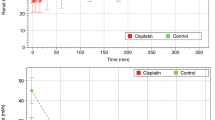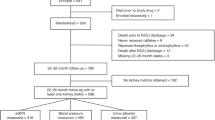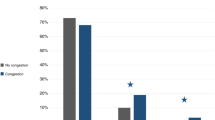Abstract
Abstract: Renal hemodynamics and functions were assessed in four groups of anaesthetized newborn rabbits receiving a single intravenous dose of methylxanthines, i.e.: aminophylline: 3 mg/kg (Al) or 6 mg/kg (A2); sodium benzoate caffeine: 5 mg/kg (Cl) or 10 mg/kg (C2). Each animal acted as its own control. The mean PAH extraction ratio was not modified by the methylxanthines. Renal blood flow and glomerular filtration rate were determined by clearances of paraaminohippuric acid and inulin, respectively. No changes in renal hemodynamics or renal functions were observed in group Cl. In group C2, renal blood flow and filtration fraction did not vary significantly but renal vascular resistance showed a delayed increase. Systemic infusion of the two aminophylline regimens induced a delayed increase in renal vascular resistance with a concomitant fall in renal blood flow and an increase of filtration fraction in group A2. Glomerular filtration rate was either reduced (3 mg/kg aminophylline) or increased (6 mg/kg aminophylline and 10 mg/kg caffeine). Moreover, diuresis increased and tubular water reabsorption declined in groups Al, A2, and C2. High dose caffeine enhanced sodium fractional excretion. The acute renal effects of methylxanthines appeared dose- and time-related in immature animals and caffeine proved safer than aminophylline at doses used in human neonates.
Similar content being viewed by others
Log in or create a free account to read this content
Gain free access to this article, as well as selected content from this journal and more on nature.com
or
Author information
Authors and Affiliations
Rights and permissions
About this article
Cite this article
Gouyon, JB., Guignard, JP. Renal Effects of Theophylline and Caffeine in Newborn Rabbits. Pediatr Res 21, 615–618 (1987). https://doi.org/10.1203/00006450-198706000-00021
Received:
Accepted:
Issue date:
DOI: https://doi.org/10.1203/00006450-198706000-00021
This article is cited by
-
Relationship of caffeine regimen with osteopenia of prematurity in preterm neonates: a cohort retrospective study
BMC Pediatrics (2022)
-
Aminophylline for renal protection in neonatal hypoxic–ischemic encephalopathy in the era of therapeutic hypothermia
Pediatric Research (2021)
-
Nephrocalcinosis in preterm neonates
Pediatric Nephrology (2010)
-
Prophylactic theophylline to prevent renal dysfunction in newborns exposed to perinatal asphyxia—a study in a developing country
Pediatric Nephrology (2005)



